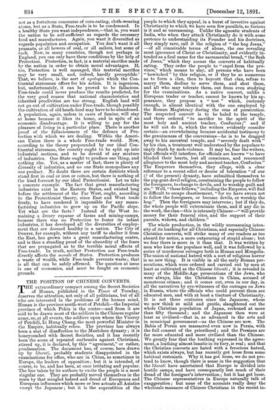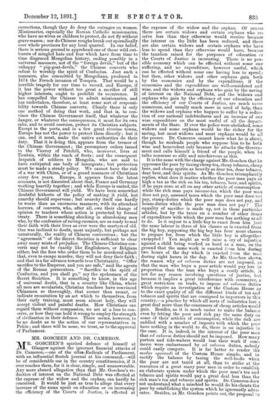THE POSITION OF CHINESE CONVERTS.
THE extraordinary compact among the Secret Societies of Hunan, published in the Times of Tuesday, deserves the attention, not only of all politicians, but of all who are interested in the problems of the human mind. Hunan is the province south-west of Petchili—the Imperial province of which Pekin is the centre—and from it are said to be drawn most of the soldiers in the Chinese regular army, or, at all events, the soldiers upon whom the Viceroy of Petehili, Li Hung Chang, the most powerful Minister in the Empire, habitually relies. The province has always been a seat of disaffection to the Mantchou dynasty ; it is honeycombed with Secret Societies, and it has recently been the scene of repeated outbreaks against Christians, stirred up, it is declared, by this "agreement," or rather, proclamation. The document has, of course, been drawn up by literati, probably students disappointed in the examinations for office, who are in China, as sometimes in Europe, the leaders of opposition ; but it is intended, of course, to be, and has been, at once irritating and popular. The line taken by its authors to excite the people is a most singular one. They are probably moved themselves in the main by that mingled hatred and dread of Europeans and European influences which more or less actuate all Asiatics except the Japanese ; but it is the superstition of the people to which they appeal, in a burst of invective against Christianity to which we have seen few parallels, so furious is it and so unreasoning. 'Unlike the agnostic students of India, who when they attack Christianity do it with some pretence to understanding its Founder and his doctrines, they simply rave, call it the religion of "the hog Jesus," —of all conceivable terms of abuse, the one revealing most ignorance of Christ or Christianity, and evidently in- tended as a foul name for the sacramental bread," the flesh of Jesus," which they accuse the converts of habitually eating. They order the people to "expel from the pro- vince," which means to slay, all persons who have been " bewitched " by this religion, or if they be so numerous as to form a clan, then to boycott that clan, refuse to marry them, decline to serve them, and shut them, and all who may tolerate them, out from even studying for the examinations. As a native convert, unlike a European trader or teacher, cannot be known by his ap- pearance, they propose a " test" which, curiously enough, is almost identical with the one employed by the Roman Magistracy during the eras of persecution. The suspected convert is to be haled to the temple, and there ordered "to sacrifice to the spirit of the most holy and ancient teacher, Confucius ;" and if he will not do it, which the writers evidently consider certain—an overwhelming because accidental testimony to the genuineness of the conversions—he is to be dragged away to his ancestral temple, and "severely dealt with" by his clan, a treatment well understood by the populace to imply death by mob-violence. It may be, fear the writers, that officials will interfere, for officials are known "to have blinded their hearts, lost all conscience, and renounced allegiance to the most holy and ancient teacher, Confucius." The Emperors themselves, they allege, with a clear reference to a recent edict or decree of toleration "of our (? of the present) dynasty, have submitted themselves to the pig-goat-devil religion, constraining the people to follow the foreigners, to change to devils, and to -worship guilt and sin." Well, "these fellows," including the Emperor, will find it difficult to escape chastisement, "for we have sworn not to follow the foreigners, or become devils, or worship the hog." Then the foreigners may intervene ; but if they do, the whole people will exterminate them, and if any die in the work, the clan—this is intensely Chinese—" will provide money for their funeral rites, and the support of their parents, widows, and children."
The whole production, in the wildly unreasoning inten- sity of its loathing for all Christians, and especially Chinese Christian converts, will strike many of our readers as too absurd for notice, a mere outpouring of stupid abuse ; but we fear there is more in it than that. It was written by men who knew the populace well, and it was followed by a series of murderous outrages both in Hunan and Mongolia. The union of national hatred with a sort of religious horror is no new thing. It is visible in all the early Roman per- secutions, which were ordered and carried out by men at least as cultivated as the Chinese literati; it is revealed in many of the Middle-Age persecutions of the Jews, who were always, like the Christians in China, accused of monstrous crimes ; and it comes out, even in our day, in all the narratives by eye-witnesses of the outrages on Jews in Russia, where the officials who could prevent them are educated men, and with at least a tincture of Christianity. It is not three centuries since the Japanese, whom we now think so mild and gentle, slaughtered out the whole Christian population of Japan, reckoned at more than fifty thousand ; and the Japanese then were at least as civilised—that is, as advanced in the arts and in municipal government—as the Chinese are now. The Babis of Persia are massacred even now in Persia, with the full consent of the priesthood ; and the Persians are far more educated and more civilised than the Chinese. We greatly fear that the loathing expressed in the agree- ment, a loathing almost lunatic in its fury, is real ; and that the Christian converts are hated with a ferocious hatred, which exists always, but has recently got loose from some habitual restraints. Why it has got loose, we do not pre- tend to know, though there is sense in the suggestion that the literati have ascertained that Europe is divided into hostile camps, and have consequently lost much of their dread of the foreigner's intervention ; but it has got loose. The Chinese representatives in Europe naturally talk of exaggeration ; but none of the accounts really deny the wholesale massacre of Chinese Christians in the recent in- surrections, though they do deny the outrages on women. Missionaries, especially the Roman Catholic missionaries, who have no wives or children to protect, do not fly without grave reason; nor do Chinese roughs break out sporadically over whole provinces for any local quarrel. In our belief, there is serious ground to apprehend one of those wild out- bursts of mingled hate and fear which have from time to time disgraced Mongolian history, ending possibly in a universal massacre, not of the "foreign devils," but of the unhappy "pig-goat-devils," the Chinese converts who refuse to worship the spirit of Confucius. Just such a massacre, also committed by Mongolians, produced in 1874 the French invasion of Tonquin. That would be a horrible tragedy for our time to record, and Europe, if it has the power without too great a sacrifice of still higher interests, ought to prohibit its occurrence. It has compelled the Chinese to admit missionaries, and has undertaken, therefore, at least some sort of responsi- bility towards Chinese converts. Clearly there is only one method of doing that work, and that is, to con- vince the Chinese Government itself, that whatever the danger, or whatever the consequences, it must for its own sake, and to avoid coercion, protect its Christian subjects. Except in the ports, and in a few great riverine towns, Europe has not the power to protect them directly ; but it can, and it must, make the native authorities do their duty. That it is doing this, appears from the tremor of the Chinese Government ; the peremptory orders issued to the Viceroy of Petchili, who, moreover, lives at Tientsin, within the reach of fleets ; and the consequent despatch of soldiers to Mongolia, who are said to have extirpated one body of insurgents ; but protection must be made a steady policy. We cannot have the risk of a war with China, or of a grand massacre of Christians every five years. Europe, it appears from the latest accounts, is not disunited about that, France and Germany working heartily together ; and while Europe is united, the Chinese Government will yield. We have been somewhat doubtful hitherto of the policy of making it yield, lest anarchy should supervene ; but anarchy itself can hardly be worse than an enormous massacre, with its attendant horrors, of converts, who, after all, owe their change of opinion to teachers whose action is protected by formal treaty. There is something shocking in abandoning men who, by the confession of raving enemies, are as ready to seal their faith with their lives as ever were the martyrs of old. One was inclined to doubt, most unjustly, but perhaps not unnaturally, the reality of Chinese conversions ; but the " agreement " of the Secret Societies is sufficient to clear away many mists of prejudice. The Chinese Christian con- verts may not be exactly like Englishmen, or Belgians either, but the foes who order them to be murdered admit that, even to escape murder, they will not deny their faith ; and that is a far advance towards true Christianity. "Offer sacrifice to the Emperor, and you are safe," said the agents of the Roman persecutors. " Sacrifice to the spirit of Confucius, and you shall go," say the spokesmen of the Secret Societies. It is something to know, in this age of universal doubt, that in a country like China, where all men are secularists, Christian teachers have convinced Chinamen so thoroughly, that sooner than recant, or indicate recantation by an act which to themselves, from their early training, must seem almost holy, they will accept violent and painful deaths. How Christians can regard them without compassion, we are at a loss to con- ceive, or how they can hold it wrong to employ the strength of civilisation in their defence. There seems, however, to be no doubt as to the action of our representatives in Pekin ; and there will be none, we trust, as to the approval of Parliament.











































 Previous page
Previous page